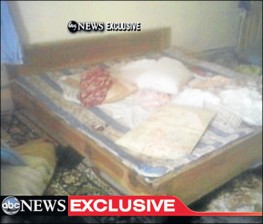The United States warned Monday it would probe Osama bin Laden’s support network in Pakistan, raising tough questions for its anti-terror ally after killing the al-Qaida kingpin in a daring raid.

AL-QAIDA MASTER BEDROOM This frame grab from video obtained exclusively by ABC News on Monday shows a section of a room on the 3rd floor in the compound in Abbottabad, Pakistan, where al-Qaida leader Osama bin Laden was found and shot dead. AP
Officials said DNA tests had proven conclusively that the man US special forces killed Sunday in the city of Abbottabad was indeed their reviled foe blamed for the deaths of 3,000 people in the Sept. 11 attacks in 2001.
US President Barack Obama’s top anti-terror adviser John Brennan said it was “inconceivable” Bin Laden did not have a support network in Pakistan.
US officials are puzzled by the comfortable surroundings of the Abbottabad compound where Bin Laden lived, and the fact that his presence in a fortified, upscale building did not attract Pakistani authorities’ suspicions.
In another sign of mistrust between Washington and Islamabad, Brennan said US officials did not notify Pakistan of the raid until its helicopters exited Pakistani airspace with Bin Laden’s remains.
Pakistani President Asif Ali Zardari defended his country against accusations it did not do enough to track down Bin Laden, but made no direct comment on alleged intelligence failures.
“Although the events of Sunday were not a joint operation, a decade of cooperation and partnership between the United States and Pakistan led up to the elimination of Osama bin Laden as a continuing threat to the civilized world,” Zardari wrote in an op-ed for the Washington Post.
Underneath a headline reading “Pakistan did its part,” he added: “We in Pakistan take some satisfaction that our early assistance in identifying an al-Qaida courier ultimately led to this day.”
But Zardari offered no explanation on how Bin Laden managed to live for years undetected in Abbottabad, a hillside retreat popular with retired Pakistani generals just a few hours’ drive from Islamabad.
“He was not anywhere we had anticipated he would be, but now he is gone,” Zardari wrote.
Pakistan’s envoy to the United States, Husain Haqqani, promised in an earlier interview with CNN that a “full inquiry” would be held into any intelligence failures.
Angry US lawmakers demanded to know how a man blamed for killing thousands of Americans lived unperturbed in a country that receives billions of dollars of US aid.
Leaders in both Afghanistan and India said Bin Laden’s discovery so close to Islamabad vindicated their claims of double-dealing by their nuclear-armed neighbor.
Elite troops from the US Navy SEALs carried out the assault, which lasted less than 40 minutes.
Residents in Abbottabad were stunned when they switched on their TV sets after daybreak to hear Obama announce that Bin Laden had been killed in their hometown, which was soon engulfed by a heavy Pakistani security presence.
“We heard ambulance sirens and security people shouting. We saw fire and flames coming out,” said a resident too frightened to give his name.
Until now, Bin Laden had always managed to evade US forces, despite a $25-million bounty on his head, and was most often thought to be hiding in the rugged mountainous terrain along the Afghan-Pakistani border.
His presence in Abbottabad—a leafy town home to an elite Pakistani military academy—heightened doubts about the Islamabad government’s zeal for prosecuting the war on terror.
Secretary of State Hillary Clinton said “cooperation with Pakistan helped lead us to Bin Laden and the compound in which he was hiding,” but Brennan’s more detailed comments revealed the independence of the US operation.